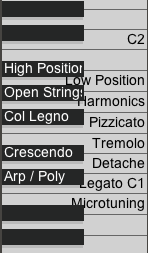Tried another daw, it is nice, but it just feels so limiting. I think I'm going back to my trusty old reaper.
Although people claim reaper to be complex, I think it's actually simpler in terms of philosophy: one type of track, send anywhere, one list for audio processing, and you can do anything. So you have a few really basic building blocks (no instrument racks, dedicated channels, or special use case handling, just put the thing you need on the track and you're done).
The complexity comes from it not being streamlined for basic usage out of the box: unintuitive shortcuts, mouse modifiers and toolbars, no predefined screen layouts for different purposes, unorganized menus. But, if you change these you can really make it simple. I've changed all of the kbd shorcuts (removed most), and assigned the simplest possible mapping for how I use it.
I do miss the articulation manager, a visual one, one of the "click click click done" type.
Although people claim reaper to be complex, I think it's actually simpler in terms of philosophy: one type of track, send anywhere, one list for audio processing, and you can do anything. So you have a few really basic building blocks (no instrument racks, dedicated channels, or special use case handling, just put the thing you need on the track and you're done).
The complexity comes from it not being streamlined for basic usage out of the box: unintuitive shortcuts, mouse modifiers and toolbars, no predefined screen layouts for different purposes, unorganized menus. But, if you change these you can really make it simple. I've changed all of the kbd shorcuts (removed most), and assigned the simplest possible mapping for how I use it.
I do miss the articulation manager, a visual one, one of the "click click click done" type.




